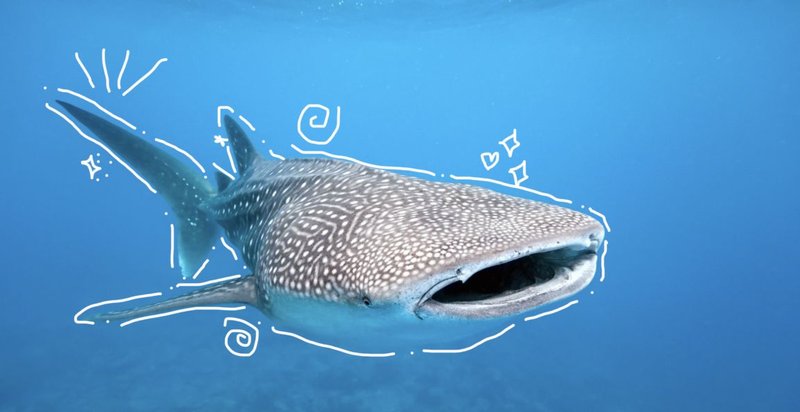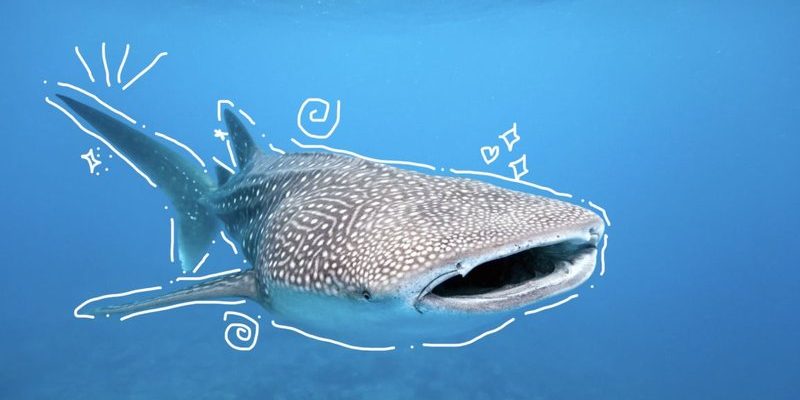
So, why should you care about these gigantic fish? Well, for starters, whale sharks play a crucial role in our ocean’s ecosystem. Learning about them can help us understand their importance and why we need to protect their habitats. If you’re curious about these amazing creatures, let’s dive into some cool facts that might just blow your mind!
1. They Are the Largest Fish in the Sea
You might think that title would go to a whale, but that’s a common misconception! The whale shark holds the record as the largest fish species on the planet. These creatures can grow up to 40 feet long. To put that in perspective, that’s about the length of two school buses parked end to end!
Despite their massive size, whale sharks are filter feeders. They consume tiny organisms like plankton, which means they’re not looking to snack on larger fish or anything that would pose a threat to humans. It’s like having a giant vacuum cleaner cruising around the ocean, collecting only the smallest bites. How cool is that?
2. They Have Unique Patterns
Whale sharks sport unique, polka-dot patterns on their skin, which are as distinctive as human fingerprints. No two whale sharks have the same pattern, making it easier for researchers to identify and track them over time.
This characteristic also highlights how beautiful these creatures are. Picture a night sky filled with stars—every whale shark you see will look different, just like constellations. Scientists use these patterns to study their movements and behavior, helping us learn more about their lives in the ocean.
3. They Can Live a Long Time
Whale sharks are not just big—they’re also incredibly old. Some estimates suggest they can live for about 70 to 100 years! That’s like having a great-grandparent who’s seen a lot of change in the world.
Studying their lifespan can reveal interesting insights into the health of ocean ecosystems over decades. Their longevity is a reminder of how vital it is to protect their populations from threats like overfishing and habitat destruction.
4. Migratory Giants
Whale sharks are known to be migratory, traveling thousands of miles across oceans. They often follow warm currents, looking for abundant feeding grounds. It’s like their very own ocean cruise! They are known to gather in specific areas at certain times of the year, making them easier to spot for researchers and divers.
For example, one of the most famous locations to witness these gentle giants is the Ningaloo Reef in Australia. Every year, they flock there to feed, providing a unique opportunity for snorkelers and divers. Imagine floating in warm, clear water and having a whale shark glide gracefully below you—it’s a bucket-list experience for many ocean lovers!
5. They Have a Big Heart—Literally!
Did you know that a whale shark’s heart can weigh as much as 400 pounds? That’s about the same weight as a small car! Their massive heart pumps blood through their enormous bodies and is essential for delivering oxygen as they swim long distances.
Their hearts are also a great example of how evolution has shaped these creatures. They have adapted to their size and lifestyle, ensuring they can thrive in the vast ocean. It’s a fascinating insight into how nature works!
6. Social Creatures
Whale sharks might seem solitary, but they can actually be quite social. They are often found swimming in groups, especially during feeding times. Imagine a buffet line where everyone is calmly enjoying a meal together—that’s what these gatherings can look like!
During these encounters, researchers have noticed that whale sharks may even communicate with each other through body language. It’s a reminder that our underwater friends have lives that are rich and complex, just like we do.
7. They’re Not Threatened by Humans
While many species of sharks face threats from overfishing and habitat loss, whale sharks are often more resilient. This is partly due to their diet and size, which means they don’t compete with humans for resources like smaller fish do.
However, that doesn’t mean they’re entirely safe. They can still be affected by environmental changes, fishing practices, and boat traffic. Understanding their needs and protecting their habitats is crucial for their survival.
8. Conservation Efforts Are Underway
Organizations and scientists around the world are working hard to protect whale sharks and their environments. Efforts include monitoring populations, implementing marine protected areas, and educating local communities about sustainable fishing practices.
By raising awareness and fostering respect for these magnificent creatures, we can help ensure their survival for future generations. Engaging in ocean conservation can feel as rewarding as caring for a pet—it helps create a healthier planet for all.
9. They Can Be Found in Tropical Waters
Whale sharks prefer warm waters and are often found in tropical and subtropical regions. You might spot them in places such as the Caribbean Sea, the Gulf of California, or around the Indian Ocean. They tend to stay in shallow coastal waters near islands, making them more accessible to researchers and divers.
Understanding where they thrive helps conservationists prioritize areas for protection. It’s like creating safe havens for wildlife, which can lead to thriving ecosystems.
10. They Are a Source of Inspiration
Finally, whale sharks inspire not just researchers but also artists, writers, and conservationists. Their gentle nature and sheer size capture the imagination and remind us of the beauty of our oceans. They encourage us to think about how we can coexist with wildlife and protect our planet.
From documentaries to art installations, these creatures leave a lasting impression on anyone fortunate enough to learn about them. They show us that there’s much more to the ocean than what meets the eye, and we should cherish and protect this incredible life.
In summary, whale sharks are truly remarkable animals that contribute significantly to our oceans’ health and beauty. Their size, longevity, and gentle nature make them stand out among sea creatures. By learning about them and advocating for their protection, we become part of the solution to preserve our oceans for generations to come. So, the next time you think of sharks, remember the gentle giant, the whale shark, and all the cool things that make it special!

